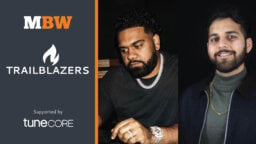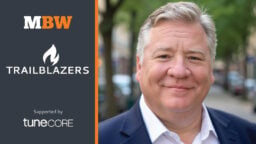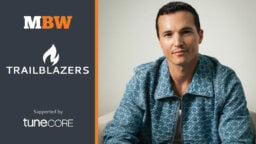Trailblazers is an MBW interview series that turns the spotlight on music entrepreneurs with the potential to become the global business power players of tomorrow. This time, we meet Atlanta-based artist managers and music executives Barry Johnson and Zeke Nicholson, co-founders of Sincethe80s, which operates across management, label, publishing and creative agency services. Trailblazers is supported by TuneCore.
Sincethe80s says it digs deep into hip hop’s storied past for inspiration to develop the genre’s stars of the future.
Co-founder Barry Johnson explains that the Atlanta-headquartered company, which operates across management, recordings and publishing “wanted to pay homage to great management companies” that launched the careers of some of hip hop’s biggest artists.
He cites as an inspiration Violator, the New York-based management company and record label founded by the influential music executive Chris Lighty, which worked with hip hop icons from Busta Rhymes and 50 Cent to Q Tip and many others.
Johnson adds that his own company, Sincethe80s, whose roster features the likes of 3x Grammy-nominated rap duo EarthGang and 3x Grammy-nominated lyricist J.I.D – was intended to be “an ode to hip hop and the business [of] hip hop in the ’80s”.
Co-founder Zeke Nicholson echoes Johnson’s explanation about their motives behind launching as a management company in 2018 (alongside then-21 Savage manager Kei Henderson, who has since launched her own business, Third & Hayden).
“It was a way of paying homage to those amazing rap labels and collectives in the 80s that commodified the music business and really helped build our culture to be a financially vibrant ecosystem,” he says.
“We’re honoring the past, respecting the present, and gearing up for the future,” adds Johnson.
Sincethe80s’ Atlanta-based co-founders cut their teeth in the industry via the Pittsburgh hip hop scene at college parties over a decade ago. Barry Johnson started off as an artist, but says that he “realized it wasn’t really what [he] wanted to personally do as far as the commitment that goes into it”.
He still figured out a way to be part of the music business, becoming a promoter for college shows. This led to him connecting with Mac Miller, Wiz Khalifa, Big Sean, and G.O.O.D Music, working with their marketing and promo team. He eventually worked with Travis Scott on several of his early career projects.
Johnson says that this all led to discovering EarthGang and J.I.D. and establishing his career as a manager. “I’ve now been with [them] for about 10-11 years,” he says.
Zeke Nicholson, meanwhile, explains that he got his start back in high school while interning at a nonprofit organization called the Community Empowerment Association.
“My summers were spent planning a city-wide festival where we’d have vendors, musical performers, basketball tournaments etc,” he remembers. “In my senior year, I met Barry at one of the parties. The next fall I was a freshman at the University of Pittsburgh and started throwing parties alongside Barry.”
He explains how he built up his initial network in the music industry via friends and schoolmates. “Will Dzombak and I went to high school together and he started to work with Wiz Khalifa,” he says. “One of my best friends, Quentin Cuff, was managing Mac Miller.”
Nicholson adds that their early relationships with Wiz Khalifa and Mac Miller “created a real movement in the city” and that they “did a lot of marketing” for college events at West Virginia, Penn State, and the University of Pittsburgh. “Kind of everywhere on the East Coast,” says Nicholson.
“That’s kind of how we broke into the music industry; from working with musicians and figuring out ways to attract a college audience and directly introduce new, young artists to young audiences. It’s always been about community for us. That allowed us to have a [talent] pipeline.”
Today, in addition to two of the biggest artists on its roster, J.I.D and EarthGang, the Atlanta-headquartered company works with the likes of AKIA, Benji., SoFaygo, NJOMZA, Hardo, and DEADonMARRS as well as recent signing, SaveHxpe.
EarthGang’s most recent album, Perfect Fantasy (Since the ’80s/Dreamville/distributed by United Masters), released last month, features collaborations with superstars from Damon Albarn to Pharrell and Snoop Dogg.
“EarthGang’s brand has always been a brilliant spot in our business, because it’s limitless,” comments Johnson.
He also notes that their management client, rapper J.I.D, “has sold 20 million records” to date, with Nicholson highlighting that he recently performed at the Tyson Fury vs Oleksandr Usyk fight in Saudi Arabia in May.
Here, Barry Johnson and Zeke Nicholson tell us about the company’s origins, what they look for in the artists they work with, how hip hop is positioned in the global music business, and why they expanded into the label and publishing worlds via management…
When was Sincethe80s launched and what were your ambitions for the company when first established?
Barry: The idea came out of a place of frustration feeling like there were not enough powerful black managers that had come together to build what a Blueprint or a Violator did for hip hop back in the day. I saw a lot of our black artists going to a lot of white managers and was wondering why this is. There’s strength in numbers, so I went to a lot of different prominent managers and said we should just build this conglomerate and the only one that hopped on board at the time was Kei Henderson, who was managing 21 Savage.
We all came together and started Sincethe80s seeing that we were all actually doing the work of a label anyway. We were the marketing teams, we were the strategists, we were the PR, we wore a lot of hats for our artists, so the transition made a lot of sense.
Zeke: Sincethe80s launched in 2018, after about 10 to 12 years of me and Barry working with each other. We started the company with myself, Barry, and at the time we had another partner named Kei Henderson, who is no longer in the company as she’s founded her own business Third & Hayden since then.
It was born out of that space of wanting to be able to affect the music business by teaching people different skill sets through the power of micro communities. That ethos is what leads us to offer management, label, distribution, publishing and creative agency services.
How is Sincethe80s positioned in the US industry at present?
Barry: Talent Over Statistics. We believe in building artists, building brands and in the longevity of an artist. We’re not looking to rush anybody’s career. We based our whole label on that premise, just building talent and developing their art. Like talent is a seed and it matters how you plant and water it. How it grows is based on what you put into it. You have to develop these artists. We’re not looking for numbers. We’re looking for talent, vision and commitment.
Zeke: At present, people look at our company as a company that typically deals with developing artists and building brands. We have a long-standing history of dealing with artists from scratch and from zero and building enterprises around each artist we work with. I think it’s important for us to continue to work with developing artists and developing talent. It’s our ethos. We are builders.
Could you tell us about some recent highlights and upcoming highlights?
Barry: We’ve been working with J.I.D for about 10-11 years, he had his first Gold album, and first triple platinum single recently. He’s sold over 20 million records to date and is really in his prime. We built up the touring and we’ve done the development to get him to a place where he’s reached a certain threshold and now the sky’s the limit. We’ve established him with different brands. We had Fortune 500 companies come in last year and really put their money behind what he does. EarthGang’s brand has always been a brilliant spot in our business, because it’s limitless.
We’re looking forward to Akia’s new album that we plan on dropping and this kid SaveHxpe we just signed, I’m very interested to see what we could do with him. We’ve invested into a lot of businesses on the back end of things. I’m interested in dipping into a lot of those different investments in the same way we’re investing into people and creatives through the years in this business.
Zeke: I’m proud of our recent work with the EarthGang Foundation, which Is focused on climate action. They have a partnership with The UN Oceanic Global. Our partnership with the NBA Rookie Program felt really unique. We’re looking forward to diving deeper into film and sports. We’re interested in working with talented people in a multitude of areas. We’re building a company that lives and breathes entertainment and creativity.
what do you look for in the artists you work with across management, label and publishing?
Zeke: I pride ourselves in being able to tell stories. So I look for artists that are looking to tell different stories and [an] ability to build brands out. I don’t look at artists from simply the music standpoint. I like to be able to take their interests and figure out ways to build businesses around them. So for instance, with EarthGang, we love their music.
We’ve been fans of the guys for the entirety of us working with them, but we knew it was also important that they figure out ways to really be their namesake and now we have them thinking about sustainability and climate action. It was important for us to build a foundation that sits beside them, but also separate to their music business.
“The artist is the engine in the car, we’re just passengers in the journey of an artist. We’re a support system.”
Barry: Passion, hunger, desire, dedication and will. Musical opinions are subjective. I look for people with a vision for themselves, and if they don’t have a vision, they are willing to accept a vision, be attentive, and want to work towards that goal.
If the artist is just talent, just raw talent and needs refining, we’re a refinery. The artist is the engine in the car, we’re just passengers in the journey of an artist. We’re a support system.
Sometimes you get the grapes, but the grapes aren’t wine until you step on them. We just try to find out what system and what things work best for that artist, but the artist also has to wanna come to work and do that, so that we want to dedicate our time and resources to the act as well.
What are your short-term and long-term predictions for Hip Hop’s positioning on streaming platforms and charts globally?
Barry: Short term, I think we are seeing a streaming bubble burst and that’s not just across hip hop because it reached pop before it ever touched hip hop. In the industry, I think you’re going to start seeing that social media has made everything and everybody so accessible that now we have a lack of appreciation for things – the music, content, everything.
We’re gonna see a reset to where we go back to a super physical component of things, because we’ll now have to create something memorable and something more than just a flash-in-a-moment thing to solidify experiences in people’s heads.
The streaming and festival bubble is gonna burst and it’s gonna go back to people finding organic ways to really build subsections. Long term, in the next five to 10 years, I think we’re going to start seeing stardom shrinking, you’re not going to see a lot of new mega stars in the musical superstardom space.
Some people will get to stardom. I just don’t know how long and how far their superstardom will last. It’s just going to look different. There’s so many creatives, like, I don’t have to just focus on an artist to be the creative. I can focus on a streamer. I can focus on anybody. I also think regional things will come back. Regional appreciation and niche pockets of appreciation will be what create the next superstars/megastars of the world.
“Hip hop is gonna continue to grow. It’s probably one of the most impactful genres of music in the world.”
Zeke: Gobally, hip hop is gonna continue to grow. It’s probably one of the most impactful genres of music in the world. From traveling globally, I’ve seen so much of its influence continue to offshoot in countries that are just now getting a real chance to understand and interact with it.
Streaming altogether will stabilize. I think there’s gonna be a comeback of figuring out ways to physically interact with music. I think rap music will see a balance of large physical catalogs as opposed to large streaming numbers.
What business and creative trends are you seeing in the market that you are excited about or concerned about?
Barry: To be honest, I don’t really know. I’m not one of those types of people. So, for artistry, I’m [not] concerned about paying too much attention to trends. I don’t pay attention to trends. I pay attention to the business.
Zeke: I’m excited that it seems like there’s gonna be a larger emphasis on not only storytelling in a digital sense, but storytelling and real-life experiences.
It seems like there’s gonna be more experience with marketing ideas happening, especially in the US. I think in Asia, they still hold that high standard of real world moments. I’m interested to see how we will be utilizing the advancements of AI technology.
I know a lot of people are concerned but I remain optimistic. I look forward to people enjoying all the mediums of music again. It’s been devalued lately. Many people see music as an asset; where people just utilize it as more of a soundtrack to a clip and do not really experience the music as we once did. I want people to experience the music, experience the shows, and be present no matter how they choose to do so.
What advice would you give to aspiring entrepreneurs/label founders?
Barry: Find something else to do, because the commitment to what you have to sacrifice to get here is extraordinary. We want to fakely discuss balance, but everything is a time equation. You have to find a way to live in harmony with this. Balance is me weighing one thing versus the other. You have to figure out a way to make [a career in] this [industry] flow with your life and the people in it have to flow with your life because there’s no real balance in this.
“If you’re going to commit to this, just understand there’s a lot of sacrifices to go with it on all fronts.”
If you’re going to commit to this, just understand there’s a lot of sacrifices to go with it on all fronts. I mean it’s like working out. It doesn’t feel good when you’re stretching your muscles, but you like the tone that you get from it and the results. It’s a painful but beautiful process, but you gotta love the pain to experience the best of it.
Zeke: I would say stay true to whatever vision you have for yourself and your company. It’s not an easy journey, but it’s important to kind of have a real clear-cut vision of where you want to be and how you want your company to be present.
Surround yourself with smarter people that will challenge your way of thinking. I think it’s equally important to appreciate the small steps and the relationships you make along the way.
Oftentimes it helps to have those experiences and those relationships as you get bigger. That’s the most important and probably the best advice I would give. The other part of that is knowing when you’re heading in the wrong direction and be comfortable with pivoting and figuring out alternative ways of seeing your plan through. Learn from the losses.
What does success look like to you?
Barry: Changing lives. Success is so different for everybody. It’s hard for me to really define success because I don’t equate it to money or awards. These are things that if I do get them, that’s dope, but I think my version of success is being able to do what you love on a daily basis. It’s not even about happiness because like, nobody’s always happy.
Do you get up every day and love what you do and would you do it for $0? Success is when you’re doing what you love and you have the freedom to do it. Money comes and goes, you know what I’m saying? If money is what makes you happy, then you’re going to be unhappy.
Zeke: I’m probably simple in this regard. What success looks like for me is the ability to continue to take care of my family doing something I love doing. I don’t really have any benchmarks that are ever super present because it’s one of those things where I hope I’m at the point where it’s just clear because I did all this.
As long as it’s still enjoyable for me and I’m still able to impact people, I have a piece of this that I know for sure is a success. Aso, success for me is how many young executives I’m able to touch and be impactful in their careers. That’s my biggest barometer because that means that the ethos of why we created Sincethe80s, the reasons why we interact with people the way we do, means it worked. I would love to continue developing more executive talent.
If there was one thing you could change about the music business, what would it be and why?
Barry: I openly dislike dealing with lawyers in the music business. They can have some of the most predatory behavior in the industry. I also would restructure label contracts based on performance (which is already a thing) but it would already be structured into the deal up-front instead of re-negotiating.
I hate going into a music label and literally having to play music for non-cultural, disingenuous people who don’t know what’s going on in black culture. I would change the hiring process for black music and put black music in the hands of black executives. I am not saying that white people cannot work in or on it, too. I’m not saying these people aren’t good businesspeople because they are.
The music needs to be in the hands of the people who love black music and not just love the business of black music. Especially because black people make lifestyle music, so our music is directly derived from our lifestyles and who we are as people. At the end of the day, I don’t want to explain it to people who don’t get it. If you’re gonna empower somebody to do something, you need to empower the right people who are part of the culture that look like the culture. Like if we’re doing Latin music, that needs to be run by mostly Latin people. Would you have someone who doesn’t even speak Spanish as the head of a Latin label? Same thing. It needs to be run by people who are actually in the culture, not people who are looking at research numbers and bottom lines and trying to depict and build up stars.
Data & analytics driven A&R’s are a slap in the face to the emotional elements and the power of music. Numbers don’t automatically mean people care about the artist. If their art and lives are in some ways consumed, it matters that the people they’re working with understand them. The people who are in control and make decisions have to be people who understand the culture, period.
Zeke: I would make the music business still about the music and not about analytics and data. I’d remove frontline numbers from streaming services like Spotify. Album sales wouldn’t be public information. I’d allow the fan to be a fan. If you like Doritos, you don’t care how many bags of chips they sell, right?






